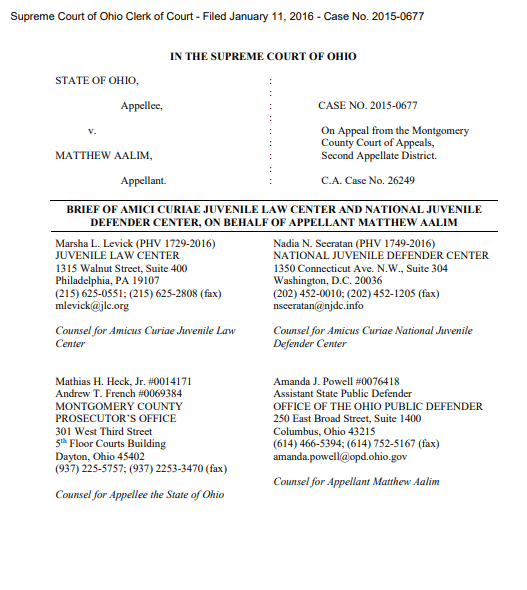
Summary of Argument
Ohio Revised Code sections 2152.10(A)(2)(b) and 2152.12(A)(1)(b) violate the Due Process Clauses of the Fifth and Fourteenth Amendments by mandating that 16- and 17-year old youth be transferred to adult court for prosecution if there is probable cause to support that the youth has committed a category two offense with a firearm. Following this probable cause determination, which takes place in juvenile court, the transfer scheme requires adult prosecution for all such youth, based solely on the crime with which they have been charged and their age at the time the crime was allegedly committed. By depriving youth of any individualized determination of amenability, this scheme denies young people their due process rights. See U.S. Const., XIV Amend. It runs afoul of general due process principles, the Supreme Court’s determination in Kent v. United States, 383 U.S. 541 (1966), that youth are entitled to particularly strong due process protections when their cases are transferred from juvenile to adult court, and the Supreme Court’s precedents recognizing that juveniles possess unique characteristics that make adult sentences often inappropriate.
While procedural due process is a flexible notion which calls for such protections as demanded by the individual situation, the essential requirements are notice and an opportunity to be heard. Cleveland Bd. of Ed. v. Loudermill, 470 U.S. 532, 542 (1985) (“An essential principle of due process is that a deprivation of life, liberty, or property ‘be preceded by notice and opportunity for hearing....”) (quoting Mullane v. Central Hanover Bank & Trust Co., 339 U.S. 306, 313 (1950)). Moreover, due process requires not just “any” hearing, but rather an “appropriate” hearing:
The hearing required by the Due Process Clause must be ‘meaningful,’ and ‘appropriate to the nature of the case.’ It is a proposition which hardly seems to need explication that a hearing which excludes consideration of an element essential to the decision . . . does not meet this standard.
Bell v. Burson, 402 U.S. 535, 541-42 (1971) (citations omitted). Indeed, the United States Supreme Court has made clear that “[t]he extent to which procedural due process must be afforded the recipient is influenced by the extent to which he may be ‘condemned to suffer grievous loss.’” Goldberg v. Kelly, 397 U.S. 254, 262-263 (1970).